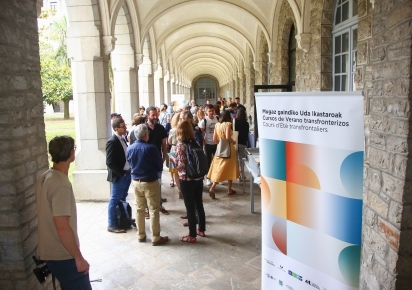Enrolment now open for the Cross-Border Summer Courses
Bayonne to host the third edition from 15 to 19 July 2024.

- The programme offers 11 free courses on different themes that will be run at the Cité des Arts university school.
- A crossing onboard the Saltillo school boat is going to take place in early July; an online activity open to the public will be organised at each stop.
The Cross-Border Summer Courses will be held in Bayonne in mid-July 2024 and will build on the rewarding experience of the first two years; the courses will kick off on 15 July by analysing the impact of cross-border university partnerships as regional dynamos to put the spirit of the courses centre stage.
The Cross-Border Summer Courses are aimed at cross-border citizens; they seek to showcase the proactive role of universities in the creation or a more cohesive cross-border area – territorially, socially and economically speaking – as has been achieved in other European cross-border zones.
This programme seeks to disseminate the knowledge generated in the participating universities and scientific entities; a further aim is to circulate the strategic plans of the public institutions in pursuit of developing a euro-regional economy based on knowledge, where innovation and the new technologies are catalyst tools to generate added value.
The courses will be run in the three official languages of the Euroregion (Basque, French and Spanish) along with English, thus stressing the value of multilingualism and interculturality. The courses will be in-person and part of the programme will also be available live online.
Project developed in conjunction with public institutions and universities of the Euroregion.
The Cross-Border Summer Courses were set up in 2022, thanks to the collaboration between the public universities of the Nouvelle Aquitaine-Basque Country-Navarra Euroregion, with the support of the region's key stakeholders. The project is the outcome of the cooperation between the following institutions: Bordeaux University (UB), the University of the Basque Country (UPV/EHU), the UPV/EHU Summer Courses Foundation, Bordeaux Montaigne University (UBM), the University of Pau and the Adour Region (UPPA), the Public University of Navarra (UPNA), the Euskampus Foundation, CNRS/IKER, and the House of Human Sciences Bordeaux (MSH Bx); with the support of territorial authorities including Gipuzkoa Provincial Government, the Nouvelle Aquitaine-Basque Country-Navarra Euroregion, and the French Basque Country Greater Administrative District Council.
A training programme comprising 11 courses
The first two editions have clearly shown the effectiveness of this project as a strategic point and dissemination hub of intercultural and multilingual knowledge, along with the ability for knowledge to be shared and encounter networks generated across borders and which lead to new opportunities and proposals in the short, medium and long term.
The third edition takes the same line. The courses will cover a wide range of themes between 15 and 19 July 2024. As already mentioned, the week will get underway by analysing the impact of cross-border university alliances as a regional dynamo; highly topical issues will be discussed at the Cité des Arts university school in Bayonne over five days.
There will be three courses on linguistics: the steps for the new linguistic policy in Iparralde (French Basque Country) will be analysed; cases studies that have driven language learning and teaching based on active participation on both sides of the border will be showcased; and an overview will be provided of the current state of dialects and of the work of young researchers in this field.
The spotlight will be on sustainability and the environment. On the one hand, the food system will be discussed, with a focus on sustainability and cooperation models for Basque cuisine; on the other hand, experts in the field will discuss the situation of the biodiversity along the Basque coast and the measures to protect the marine environment on both sides of the border; furthermore, the differential characteristics and the problems inherent to rural areas given the global change will be considered.
Themes of social interest will also be addressed. The nature and the influence of the border will be discussed by analysing different situations in other parts of the worlds; some of the fundamental principles of the public housing policy will be reviewed by analysing its application on both sides of the border; and cross-border citizen participation experiences and projects will be showcased.
As regards culture and with the focus on promoting and protecting the heritage, there will be an opportunity to learn about the technical aspects of producing spun wax, which is in danger of disappearing.
Crossing onboard the SALTILLO school boat
As part of the Cross-Border Summer Courses, there will be a voyage on the SALTILLO school boat from 2 to 5 July; it will be a chance to learn about the scientific, educational and dissemination work at universities and in the different key research and innovation projects for the socioeconomic environment of the cross-border coastline looking out to sea.
Selected students from the UPV/EHU and the University of Bordeaux will take part in the 2-day crossing onboard the Saltillo school boat. The return crossing will be between Santurtzi, home to the UPV/EHU's School of Nautical Engineering and Marine Systems, and the UPV/EHU Plentzia Marine Station (PIE); it will be complemented with in-person and online masterclasses on the health of the marine environment, which are open to everyone and free of charge.
Enrolment open until the date of holding the courses
Enrolment from 14 May. Registration is free. Information and enrolment: www.uik.eus

